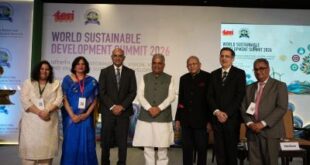Organizer: Nizami Ganjavi International Center
14 March 2024
—
Your Excellency President Aliyev,
NGIC Co-Chair Vaira Vike-Freiberga, former President of Latvia,
NGIC Co-Chair Ismail Serageldin, our moderator,
Secretary-General Rovshan Muradov,
Excellencies, honourable NGIC members, dear colleagues and friends,
I would like to start by thanking His Excellency the President for the progress Azerbaijan has made towards universal health coverage, through the mandatory health insurance scheme, which covers over 3 300 health services.
This is what health for all looks like.
I also commend you, your government and the people of Azerbaijan for your leadership in hosting COP29 later this year.
WHO looks forward to working with Azerbaijan’s Presidency to ensure health remains prominent in the COP29 agenda, building on the UAE’s legacy, which for the first time designated an entire day of COP28 to health.
My thanks also to the Nizami Ganjavi International Center for your many years of support for WHO and our mission.
Last year marked the 75th anniversary of WHO’s founding.
WHO was born in the aftermath of the Second World War, and the realization that the only alternative to global conflict was global cooperation.
Our Constitution was one of the first legally-binding document to affirm that the health of all peoples is a fundamental human right, without distinction.
But it goes further, by saying health is fundamental to the attainment of peace and security and is dependent on the fullest co-operation of individuals and States.
The COVID-19 pandemic was a vivid demonstration of this, showing that when health is at risk, everything is at risk.
The impacts of the pandemic went far beyond the death and disease caused by the virus itself, disrupting societies, economies, and health systems, as you know.
It eroded trust between people, governments and institutions, fuelled by a torrent of mis- and disinformation.
And you are well aware of the ways in which the pandemic exacerbated geopolitical tensions globally.
The key issue now is whether we will learn the mistakes the pandemic has taught us.
Because the next pandemic is not a matter of if, but when.
That is why all 194 WHO Member States are now negotiating a legally-binding agreement on pandemic prevention, preparedness and response, to provide the basis for international cooperation that was so sadly lacking during this pandemic.
When they embarked on this journey in December 2021, Member States set themselves a deadline to complete the negotiations in time for the World Health Assembly in May of this year.
That’s now less than 10 weeks away.
Countries have made good progress, and there is broad agreement on most aspects of both instruments.
But there remain critical areas where they have not yet reached consensus.
At the same time, the negotiations are being made more difficult by a torrent of mis- and disinformation about the agreement – that it’s a power grab by WHO, and will undermine national sovereignty.
These claims are totally false, as you know, but they are loud and persistent.
Time is of the essence. If we miss the opportunity to put in place a pandemic agreement, we risk losing momentum.
More importantly, we risk leaving the world exposed to the same shortcomings that hampered the global response to COVID-19: a lack of coordination, a lack of sharing information, and a lack of equity.
But if countries can come together in a spirit of compromise, they can demonstrate that when we work together, we can find common ground, a common path forward, and we can fix our fractured world.
Excellencies,
The pandemic agreement is mission-critical for humanity, and for building a healthier, safer and fairer world for the generations who will follow us.
I urge all of you who are now in government to work with a sense of urgency and solidarity to finalize the agreement in the next nine weeks.
And I urge all of you who were formerly in government to use your influence and your voices to advocate for a strong and effective agreement that can protect future generations.
75 years since the founding of WHO, the need for international cooperation is more important than ever based on a shared commitment to multilateralism, solidarity and equity
 Newspatrolling.com News cum Content Syndication Portal Online
Newspatrolling.com News cum Content Syndication Portal Online






